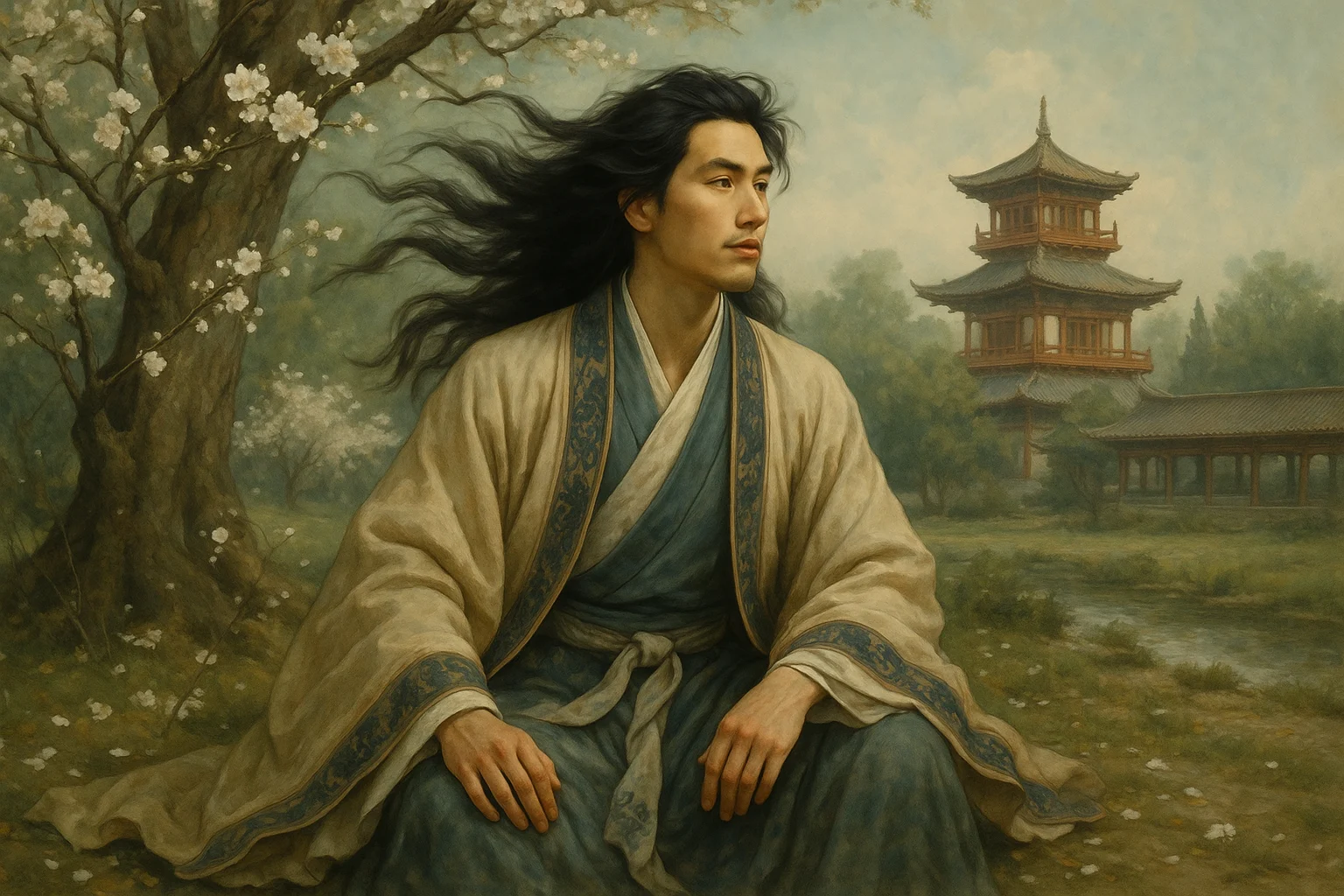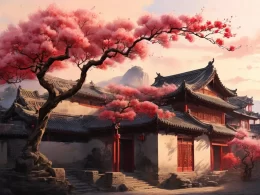Folding his tablets, he bids the Han court farewell,
Hoisting his sail, he seeks the Chu official’s hall.
Through Three Rivers’ winding town he steers,
Where nine li stretch with homes at rest and moored.
Fine wine flows near the city walls’ embrace,
Poetic talents rival Xie and Kang’s grace.
After rain, western hills wear emerald trees,
At sunrise, Nanchang’s walls glow with ease.
Dew on bamboo drips upon robes and kerchief,
Lake mists dampen locks and gateway’s wreath.
His host bears jade pendants pale and grand,
Behind rides gold-adorned horseman’s band.
Lofty in view, he governs eight provinces wide,
A shared vow to soar like hawks in the sky.
He now sets forth to repay old friends’ trust—
From here he flies, across the vast and endless dust.
Original Poem
「送李司直赴江西使幕」
韩翃
敛版辞汉廷,进帆归楚幕。
三江城上转,九里人家泊。
好酒近宜城,能诗谢康乐。
雨晴西山树,日出南昌郭。
竹露点衣巾,湖烟湿扃钥。
主人苍玉佩,后骑黄金络。
高视领八州,相期同一鹗。
行当报知己,从此飞寥廓。
Interpretation
This poem was composed by Han Hong upon bidding farewell to Li Sizhi, who was departing to assume a post as an advisor in Jiangxi. Known for his integrity and steady career, Li Sizhi inspired the poet to craft this work blending delicate landscape descriptions with vivid portraiture, expressing both blessings for his friend's future and the ache of parting. Jiangxi, then a region of political and economic significance, frames this farewell scene where official duty merges with the landscapes of the south.
First Couplet: "敛版辞汉廷,进帆归楚幕。"
Liǎn bǎn cí Hàn tíng, jìn fān guī Chǔ mù.
Rolling up official documents, he leaves the Han court;
Hoisting sails, he returns to Chu's commandery.
With economical precision, this couplet establishes the protagonist's identity and mission. The act of "rolling up documents" (敛版) conveys solemnity in departure, while "leaving the Han court" (辞汉廷) signals his high station. "Hoisting sails" (进帆) smoothly transitions to the journey, and "Chu's commandery" (楚幕) grounds the destination in historical and administrative weight. The balanced rhythm projects dignified momentum, painting a figure both solemn and composed.
Second Couplet: "三江城上转,九里人家泊。"
Sān jiāng chéng shàng zhuǎn, jiǔ lǐ rén jiā pō.
At Three-Rivers City, his vessel veers;
By nine-mile shores of homes, it moors.
Vividly cinematic, this couplet maps the voyage's geography. "Three-Rivers City" (三江城) marks a strategic waterway junction, with "veers" (转) capturing the boat's fluid motion. "Nine-mile shores" (九里人家) then pauses on a tranquil riverside settlement—the dynamic voyage contrasted with static hamlets, evoking Jiangnan's serene waterscapes and hinting at emotional respite.
Third Couplet: "好酒近宜城,能诗谢康乐。"
Hǎo jiǔ jìn Yí chéng, néng shī Xiè Kānglè.
Fine wines await near Yicheng's bounds;
His verse rivals Xie Kangle's grace.
The tone lightens here with cultured conviviality. "Fine wines near Yicheng" (宜城) nods to the region's famed brews, while "Xie Kangle" (谢康乐)—the literary name of Eastern Jin poet Xie Lingyun—elevates Li's poetic gifts through classical allusion. The pairing of wine and verse celebrates intellectual camaraderie, their bond distilled into shared refinement.
Fourth Couplet: "雨晴西山树,日出南昌郭。"
Yǔ qíng Xī shān shù, rì chū Nán chāng guō.
Rain-cleared, Western Hills' trees gleam;
Sunrise gilds Nanchang's walls.
Shifting back to nature, this couplet radiates optimism. "Rain-cleared trees" (雨晴西山树) pulse with rejuvenated vitality, while "Nanchang's sunlit walls" (日出南昌郭) expand the view to the city's grandeur. The bright imagery subtly transmutes parting sorrow into hope for Li's luminous future.
Fifth Couplet: "竹露点衣巾,湖烟湿扃钥。"
Zhú lù diǎn yī jīn, hú yān shī jiōng yuè.
Bamboo dew dots his robe and cap;
Lake mist dampens door and latch.
Jiangnan's humid dawn materializes through exquisite details. "Bamboo dew" (竹露) lends tactile freshness, while "lake mist" (湖烟) seeps into domestic spaces, blending outdoor and interior realms. The moist atmosphere carries a tinge of melancholy, mirroring the poet's unspoken wistfulness.
Sixth Couplet: "主人苍玉佩,后骑黄金络。"
Zhǔ rén cāng yù pèi, hòu qí huáng jīn luò.
The host wears jade pendants of deepest green;
His retinue's steeds gleam with golden trappings.
This couplet elevates the scene's stateliness. "Jade pendants" (苍玉佩) reflect the host's noble bearing, while "golden trappings" (黄金络) adorn his attendants' horses—a harmonious display of authority and elegance, befitting the solemnity of the departure.
Seventh Couplet: "高视领八州,相期同一鹗。"
Gāo shì lǐng bā zhōu, xiāng qī tóng yī è.
His gaze commands eight provinces;
We vow to soar as twin eagles.
Ambition takes flight here. "Commanding eight provinces" (领八州) hyperbolizes Li's far-reaching influence, while "twin eagles" (同一鹗) symbolize shared aspirations and peerless prowess. The metaphor fuses mutual respect with heroic resolve.
Eighth Couplet: "行当报知己,从此飞寥廓。"
Xíng dāng bào zhī jǐ, cóng cǐ fēi liáo kuò.
This journey shall repay your faith in me—
Henceforth I soar through boundless skies.
The finale crescendos with gratitude and destiny. "Repay your faith" (报知己) pledges loyalty to their bond, while "boundless skies" (寥廓) envision limitless horizons. The closing lines unite friendship, duty, and ambition into an exultant vow, leaving the poem aloft on wings of promise.
Holistic Appreciation
This meticulously structured poem flows with consistent rhythm, weaving together natural scenery, friendship, and official aspirations around the theme of farewell. The opening couplet succinctly sets the parting scene, followed by vivid depictions of Jiangnan's water-town life. The third and fourth couplets enhance the warm atmosphere through verses composed over wine and post-rain landscapes. The latter section highlights the host's status, demeanor, and ambitions, using an eagle metaphor to inspire future success. Detailed portrayals of characters and scenery create vibrant imagery throughout. The style elegantly balances refinement with boldness, expressing both earnest expectations for a friend's future and profound camaraderie.
Artistic Merits
Han Hong's poetry excels in detailed descriptions that craft lively tableaus, employing refined yet fluid language within symmetrical, well-balanced structures. His skillful use of metaphors and imagery conveys personality and aspirations while seamlessly blending emotion with scenery. This poem particularly showcases delicate portrayals of Jiangnan's natural environment and cultural atmosphere, embodying both sentimental warmth and idealistic ambition—a testament to Mid-Tang literati's cultural ethos and aesthetic sensibilities.
Insights
This farewell poem teaches us to face life's transitions with proactive determination, embracing lofty aspirations and soaring courageously forward. It reminds us to cherish friendships and like-minded companionship, mutually inspiring collective growth. The exquisite depictions of natural and cultural environments encourage us to observe life's details attentively, discovering warmth and beauty in everyday moments. Ultimately, the work demonstrates how classical poetry transforms personal partings into universal meditations on ambition, camaraderie, and the art of noticing.
About the Poet

Han Hong(韩翃), a native of Nanyang, Henan, was one of the "Ten Literary Masters of the Dali era" (大历十才子). He was renowned for his poetry, particularly farewell and parting verses, which gained significant acclaim during his time. The Complete Tang Poems (《全唐诗》) preserves three volumes of his works.











